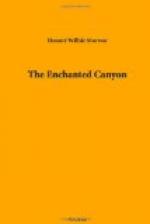“The Secretary of the Interior will be the judge. And he is not one whit interested in you and your friends growing wealthy. He is interested in Bill Jones getting electricity up on that lonely ranch of his. Never forget, Mr. Reeves, that the ultimate foundations of this nation rest on the wise distribution of its natural resources. The average citizen, Mr. Reeves, must have reason to view the future with hope. If he does not, the nation cannot endure.”
“And why do you consider yourself competent to deal with these problems?” asked the caller, with a half-concealed sneer.
“Any man with education and horse sense can handle them, provided that his philosophy is sound. You have come to Washington with the idea, Mr. Reeves, of getting at me, of tempting me with some sort of share in the wealth you see in your streams. Other men have come to the Capitol with the same purpose. I have my temptations, Mr. Reeves, but they do not lie in the desire to graft. I think there are jobs more interesting in life than the job of getting rich. All the grafting in the world couldn’t touch in interest the job of directing America’s inland destiny. And I have a foolish notion that a man owes his country public service, that he owes it for no reward beyond a living and for no other reason than that he is a man with a brain.”
Reeves, whose face had grown redder and redder, half rose from his chair.
“One moment,” said Enoch. “Have you a sound, fair, policy for Idaho water power, that will help Bill Jones in the same proportion that it helps you?”
“I had no policy. I came down here to get yours. I’ve got it all right, and I’m going back and tell my folks they’d better give up any idea of water power during the present administration.”
“I wouldn’t tell them that,” said Enoch, “because it wouldn’t be true. I am considering a most interesting proposition from Idaho farmers. I thought perhaps you had something better.”
Reeves jumped to his feet. “I’ll not be made a monkey of any longer!” he shouted. “But I’ll get you for this yet,” and he rushed from the office.
Enoch shrugged his shoulders as he turned to the inevitable pile of letters. Abbott came in with a broad smile.
“Mr. Secretary, Miss Diana Allen is in the outer office.”
Enoch scowled. “Have I got to see her?”
“Well, she’s mighty easy to look at, Mr. Secretary! And more than that, she announces that if you’re engaged, she’ll wait, a day, a week, or a month.”
Enoch groaned. “Show her in, Abbott, and be ready to show her out in five minutes.”
Abbott showed her in. She entered the room slowly, a tall woman in a brown silk suit. Everything about her it seemed to Enoch at first was brown, except her eyes. Even her skin was a rich, even cream tint. But her eyes were hazel, the largest, frankest, most intelligent eyes Enoch ever had seen in a woman’s head. And with the eyes went an expression of extraordinary sweetness, a sweetness to which every feature contributed, the rather short, straight nose, the full, sensitive lips, with deep, upturned corners, the round chin.




